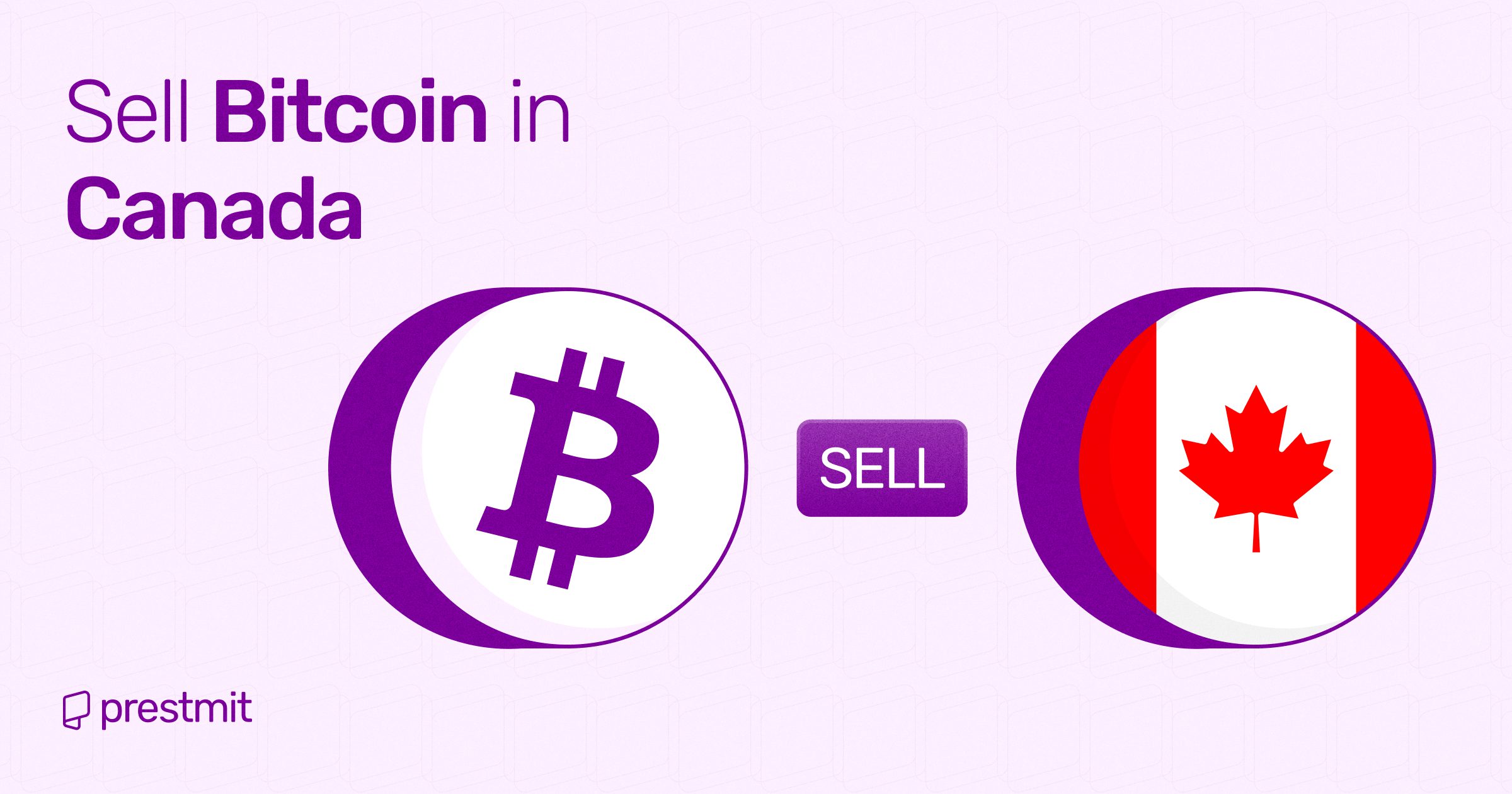Table of Contents
Canada has become a crypto paradise. Fast Interac e-Transfers? Check. Fully regulated local exchanges? Check. A government that doesn’t treat Bitcoin like contraband? Surprisingly, also check.
It is one of the few places where you can cash out your BTC through regulated local exchanges and not feel like you’re breaking a federal law. The positive sentiment around Bitcoin waxes stronger as users trade the asset to meet short- or long-term goals. Its potential to make a profitable trade has made crypto trading one of the best ways to make money online.
With all this convenience, it might sound easy, but knowing the smartest way to cash out your Bitcoin can save you time, fees, and headaches.
So let’s make this easier. This article breaks down everything: the methods Canadians actually use, the fastest ways to get your CAD, what the tax rules really mean, and how to avoid rookie mistakes that cost you money.
Why Do People Sell Bitcoin?

1. Profit Taking
When Bitcoin goes up, many people cash out to secure their gains. It’s the same way it works with every other investment; when your investment hits a target, you cash out a portion to celebrate the win.
2. Covering expenses
Sometimes the landlord prefers CAD over digital gold.
From groceries to rent to surprise medical bills, cash is still king. Most people sell Bitcoin to meet real-world obligations because, seriously, what’s the point of owning thousands in digital gold when you owe rent?
3. Portfolio balancing
Some investors rebalance their Bitcoin to reduce risk or shift into other assets. Crypto is volatile. By selling some Bitcoin, investors free up funds to diversify, maybe into stocks, real estate, or stablecoins. This way, they keep risk in check while still staying in the game.
4. Market stress and panic
No judgment, crypto dips can humble anybody. Watching Bitcoin drop sharply or the charts go on a wild roller coaster can make anyone sell just for peace of mind. Sometimes it’s about locking in profits, sometimes it’s about avoiding stress or sleepless nights.
Ways To Sell Bitcoin For Cash In Canada

1. Using Canadian Crypto Exchanges
Platforms like Newton, Shakepay, Bitbuy, Coinsmart, and NDAX allow you to sell Bitcoin for Canadian dollars and withdraw it to your bank via Interac e-Transfer or EFT. These exchanges are secure, regulated, and beginner-friendly, so even first-timers can follow the steps with ease.
Interac withdrawals usually take under 30 minutes, while bank transfers may take 1–3 business days. Fees are generally low, around 1%–2% for Interac and 0.5–1% for EFT.
Many exchanges also offer limit orders, which let you set a minimum sell price to avoid getting short-changed.
While Canadian exchanges are usually the simplest for CAD withdrawals, some people also use international platforms like Coinbase, Kraken, and Gemini. These are widely trusted, but you may encounter slightly higher fees or extra steps to move your money into a Canadian bank.
2. Bitcoin ATMs
Bitcoin ATMs allow you to turn your BTC into cash in just a few minutes. You simply scan your wallet, enter the amount you want to sell, and choose your preferred payout method. Some machines give you physical cash, while others send the funds to a digital wallet supporting CAD.
These ATMs are convenient for quick access, especially if you need money immediately or don’t have a bank account linked to an exchange.
However, the convenience comes at a cost: fees are higher than exchanges, typically between 7%–10%, and most ATMs impose daily limits on how much you can withdraw. Blockchain confirmations can take anywhere from a minute to a few hours, depending on network traffic.
They’re ideal for small, urgent withdrawals but aren’t practical for large transactions, and it’s important to check fees and limits before heading to a machine.
3. Peer-to-Peer (P2P) Marketplaces
Peer-to-peer platforms like Paxful, LocalCoinSwap, Remitano, and Bybit allow you to sell Bitcoin directly to other people, giving you flexibility over how you receive your CAD. You can get paid via bank transfer, Interac e-Transfer, or even in-person cash, depending on what you and the buyer agree on.
Sometimes, P2P trading platforms give better rates than exchanges because you’re negotiating directly with the buyer.
But it comes with more responsibility on you: you have to verify the buyer’s reputation, always make sure to use the platform’s escrow service to protect your Bitcoin, and carefully read the platform’s rules.
Transaction speed can vary; some trades complete in minutes, while others take longer, so take a little time to research the platform and avoid mistakes or scams.
4. In-Person Sales to Trusted People
Selling Bitcoin directly to friends, family, or trusted local buyers is another option, and it can be fast, fee-free, and personal. You agree on a price, transfer the Bitcoin, and receive cash or a bank transfer instantly.
This method works best for small trades or people you know well, but it carries risks if you deal with strangers. There’s no escrow or buyer protection, so if the person changes their mind or attempts fraud, there’s little recourse.
Even so, for those who prefer simplicity and trust, in-person sales can be a practical choice. It’s crucial to meet in safe, public locations and confirm payment before transferring your Bitcoin.
Steps To Sell Bitcoin On Exchanges In Canada
1. Choose Your Preferred Exchange
Choosing a preferred exchange depends on trading fees, payment options, trading pairs, and security. So go for an exchange that meets your best preference.
2. Create An Account
To sell your Bitcoin, you must create an account on your preferred exchange and complete the know-your-customer (KYC) procedure to verify your identity.
3. Deposit Bitcoin
Deposit BTC in exchange for selling your asset. This usually involves sending your BTC to the wallet address provided by the exchange for your deposit. Wait for the confirmation of the BTC deposit, and you can then sell.
4. Sell Bitcoin
You can proceed to sell Bitcoin after the exchange has confirmed its deposit. There are different ways to sell BTC in Canada, such as through an exchange. These include instant sell, market orders, and limit orders.
Bitcoin Taxes, Reporting, and Legal Considerations in Canada
Canada doesn’t consider Bitcoin as legal tender like the Canadian dollar, but it is recognized as a commodity by the Canada Revenue Agency (CRA). That means any gains you make from selling your Bitcoin are generally considered taxable.
How you’re taxed usually depends on your activity. If you’re an everyday investor selling Bitcoin occasionally, your profit is typically treated as a capital gain. You’ll only pay tax on 50% of the gain, the difference between the price you bought it for and the price you sold it for.
On the other hand, if you trade Bitcoin frequently or as part of a business, the CRA may treat your profits as business income. That can mean a higher tax bill because the rules are different.
Every transaction can be subject to reporting rules. Canadian exchanges usually provide transaction records and tax forms that make it easier to report your gains accurately. If you sell Bitcoin in-person, through P2P platforms, or via ATMs, it’s smart to keep detailed records: the date, amount of BTC, CAD value, and fees. This keeps you compliant and makes tax season way less stressful.
The good news? Canada’s crypto laws are relatively friendly compared to some countries. Selling Bitcoin is fully legal, and using regulated Canadian exchanges or reputable P2P platforms ensures you remain on the right side of the law.
Tips for Getting the Best Rate for Your Bitcoin in Canada
Here are some of the tips for getting the best rate for Bitcoin in Canada:
- Compare rates across exchanges: Small differences can add up, especially on larger sales. Check platforms like Newton, Shakepay, or CoinMarketCap for real-time BTC/CAD rates.
- Use limit orders: Set the minimum price you’re willing to accept to avoid selling during sudden dips. Most Canadian exchanges like Shakepay or Newton support this.
- Factor in fees: Interac e-Transfers usually cost 1%–2%, EFTs 0.5–1%, while Bitcoin ATMs can charge up to 10%. Know the fees before choosing a method.
- Watch market trends: Bitcoin prices fluctuate constantly. Avoid selling during a dip, or set alerts on trading platforms to catch favorable rates.
- Keep accounts verified and ready: Complete KYC verification ahead of time to avoid delays when selling large amounts.
- Choose the right platform for your amount: Large trades often do better on exchanges due to liquidity; small or urgent withdrawals may work better through ATMs or P2P.
- Sell during peak liquidity times: Midweek and daytime in Canada often have more buyers online, which can help you get a better price.
- Avoid panic selling: Emotional decisions often lead to lower returns. Stick to your plan.
- Consolidate smaller holdings: If your BTC is spread across multiple wallets, consolidating before selling can reduce multiple transaction fees.
What Are the Safety Tips When Selling Your Bitcoin?
The following are the safety tips to consider when selling your Bitcoin in Canada:
- Use regulated exchanges or trusted P2P platforms: Stick to platforms like Newton, Shakepay, Bitbuy, Paxful, or LocalCoinSwap to reduce the risk of fraud.
- Enable two-factor authentication (2FA): Protect your accounts with 2FA on every exchange or wallet you use.
- Verify buyer reputation on P2P platforms: Always check ratings and reviews before sending Bitcoin to another person.
- Use escrow services for P2P trades: Never release your Bitcoin until you have confirmed the buyer’s payment.
- Keep detailed transaction records: Track dates, amounts, fees, and CAD value of every sale for both safety and tax purposes.
- Avoid public Wi-Fi when selling Bitcoin: Use a secure, private network to prevent hackers from intercepting your transactions.
- Double-check wallet addresses: Always confirm the receiving address before sending Bitcoin. A single wrong character can cost you your funds.
- Limit large in-person sales: If selling in person, meet in a safe, public location and never hand over Bitcoin before confirming payment.
- Consider using hardware wallets for storage: Keep Bitcoin offline until you’re ready to sell to reduce exposure to hacks or theft.
Frequently Asked Questions (FAQs) About Selling Bitcoin For Cash in Canada
Where Can I Sell My Bitcoin For Cash In Canada?
You can sell Bitcoin on exchanges, P2P platforms, or Bitcoin ATMs in Canada. They enable you to receive Canadian dollars after a successful trade.
Will I Pay Crypto Tax After Selling My Bitcoin In Canada?
Cryptocurrency is treated as a commodity in Canada. Therefore, there is a crypto tax on the buying and selling of Bitcoin and other crypto activities that are deemed a business.
Is It Safe To Sell Bitcoin In Canada?
It is safe to sell Bitcoin if you are trading on a reliable exchange or P2P platform. However, you must research before choosing a platform.
Conclusion
There is an ample opportunity to explore different ways to sell Bitcoin in Canada. From exchanges to P2P platforms and Bitcoin ATMs, you can choose the best option for you.
However, before using any crypto trading platform in Canada, it is essential to consider factors like trading fees, security, and payment options.
Last updated on November 19, 2025

